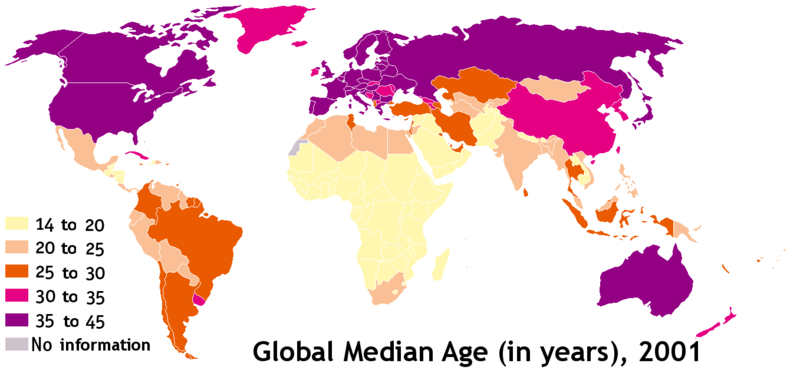Difference between revisions of "Demographic changes"
Jump to navigation
Jump to search
(→Aging) |
(→Aging) |
||
| (3 intermediate revisions by the same user not shown) | |||
| Line 1: | Line 1: | ||
==Aging== | ==Aging== | ||
In 2001 more than a third of the world population was older than 35 years. This means that by 2020 this population will be older than 55 years and will represent the "old generation" for those times. Those people will be the ones with difficulties in adapting to new environments and technology. | In 2001 more than a third of the world population was older than 35 years. This means that by 2020 this population will be older than 55 years and will represent the "old generation" for those times. Those people will be the ones with difficulties in adapting to new environments and technology. | ||
In Asia and Europe, in the next 20 years, the largest part of the population will be over 65 years and the average will approach 50. | |||
[[Image:Median age per country in 2001.png]] | [[Image:Median age per country in 2001.png]] | ||
==Enablers== | |||
No government laws regarding number of children allowed per family | |||
==Inhibitors== | |||
Natural disasters<br /> | |||
Deadly viruses pandemic<br /> | |||
Governments laws regarding the number of children allowed per family | |||
==Sources== | |||
http://en.wikipedia.org/wiki/Aging | |||
Latest revision as of 14:46, 22 May 2009
Aging
In 2001 more than a third of the world population was older than 35 years. This means that by 2020 this population will be older than 55 years and will represent the "old generation" for those times. Those people will be the ones with difficulties in adapting to new environments and technology.
In Asia and Europe, in the next 20 years, the largest part of the population will be over 65 years and the average will approach 50.
Enablers
No government laws regarding number of children allowed per family
Inhibitors
Natural disasters
Deadly viruses pandemic
Governments laws regarding the number of children allowed per family
